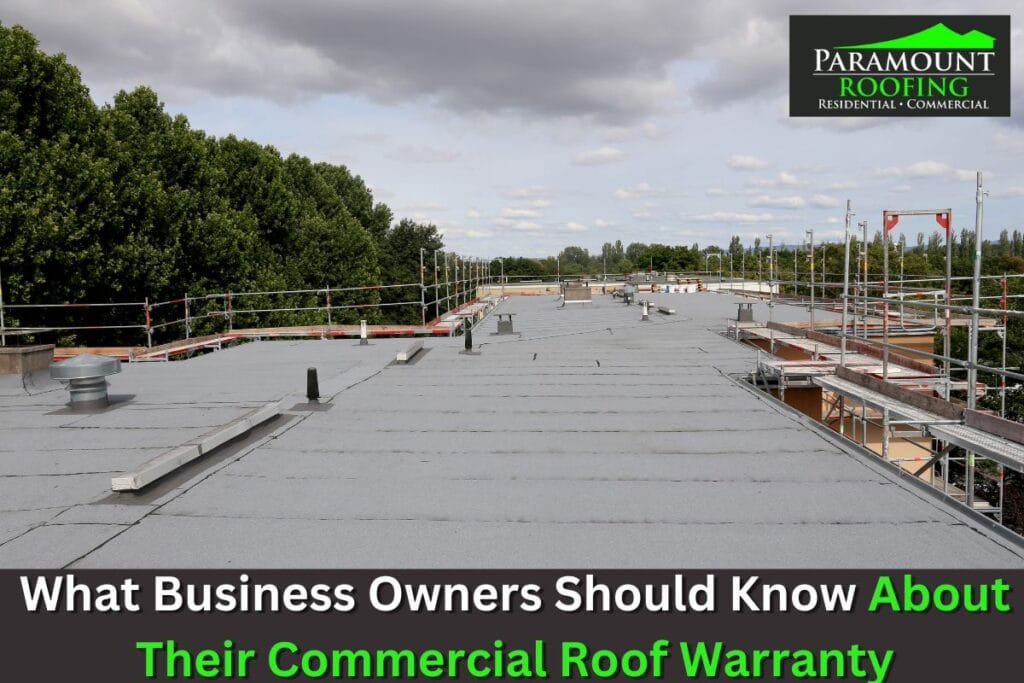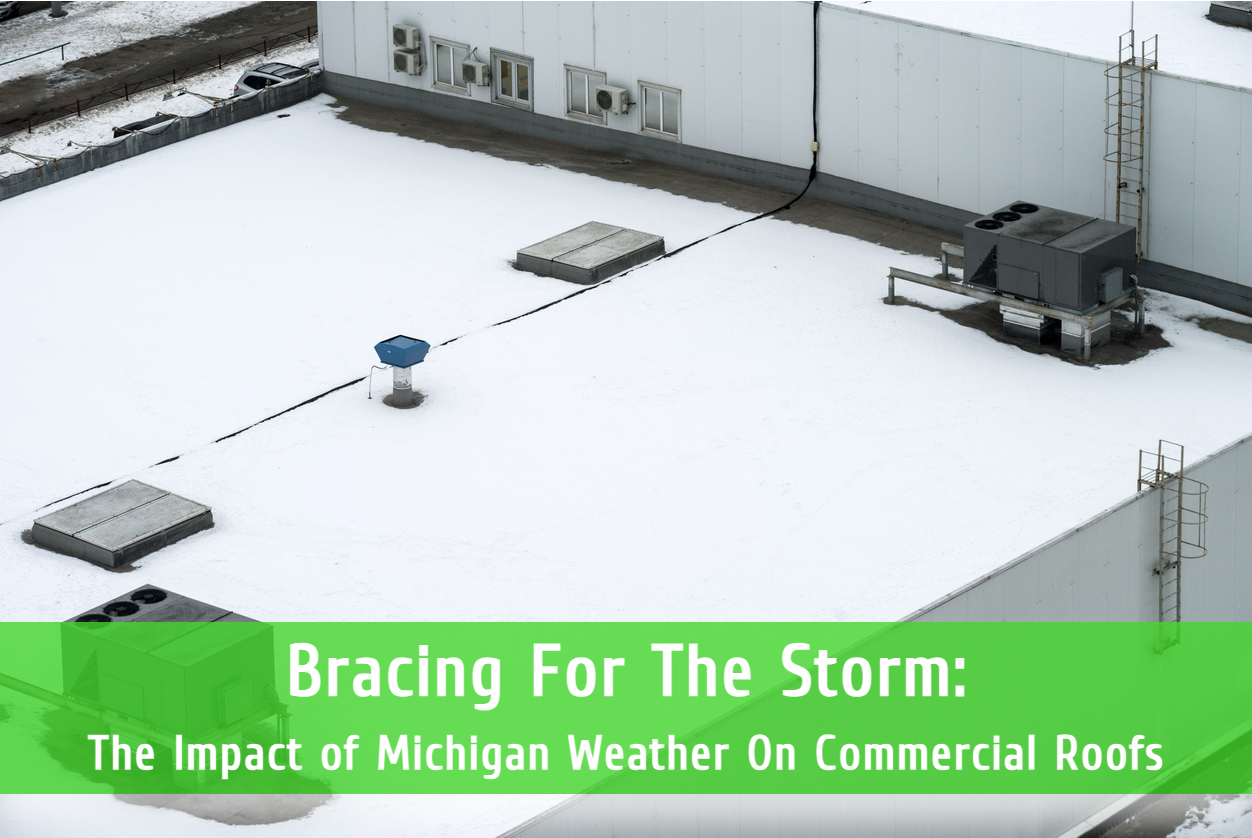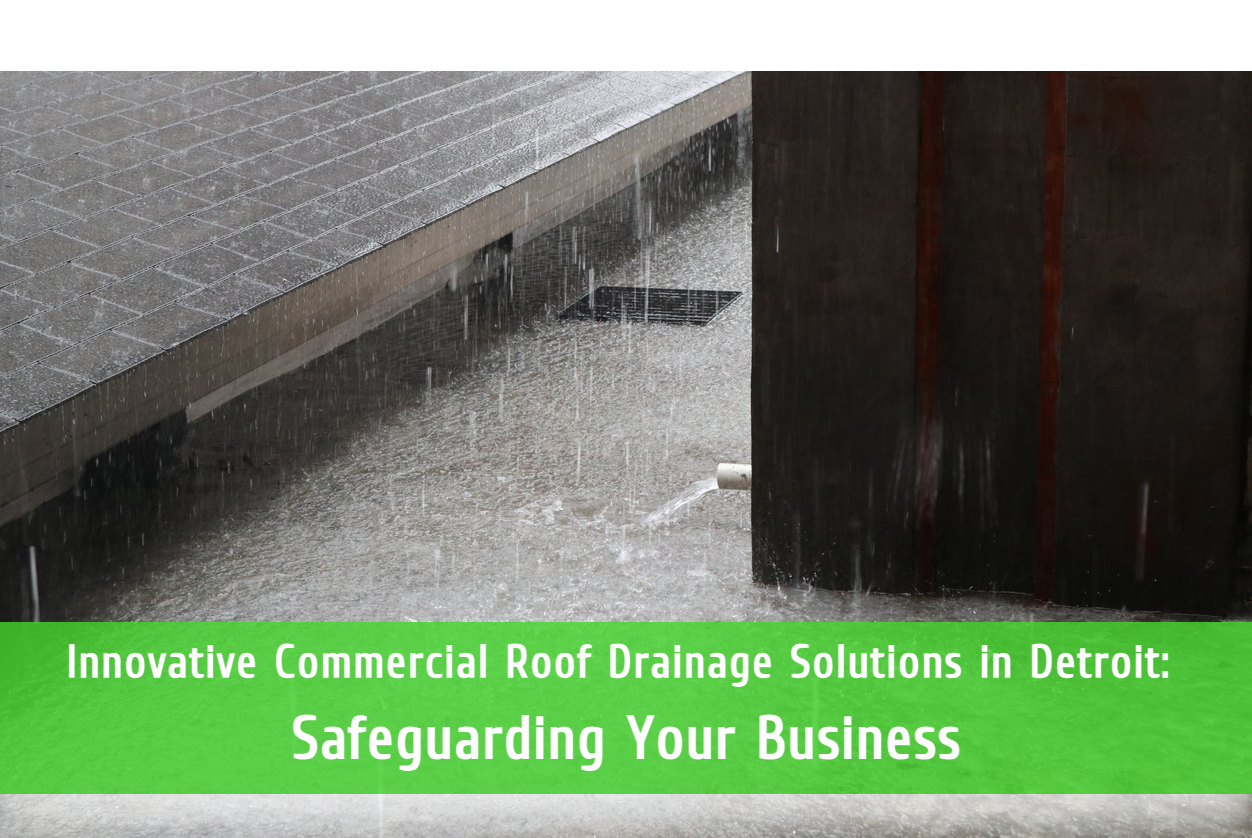What Business Owners Should Know About Their Commercial Roof Warranty

Commercial roof warranties can be a bit confusing for property owners and managers, especially if you’re not well versed in legal and roofing jargon. Your attorney, contractor, or insurance adjuster can help, but it’s important to be aware of the basic details as your commercial roof warranty directly affects your finances.
With this guide, you can get a basic understanding of what roofing contractors and manufacturers generally cover. This information will help you communicate with your insurance or roofing company and allow you to be more knowledgeable throughout your roofing project.
Understanding Your Commercial Roof Warranty
A sound warranty comes with the security that unexpected roof repairs or a full replacement won’t eat up the resources you’ve set aside for other projects or emergency expenses. But how do you know if your warranty covers a specific damage or situation? The answer is, everything is in the details.
Understanding the basics of your warranty can help you avoid the following issues:
- Each warranty has different terms and conditions set forth by manufacturers or roofing contractors. There can be numerous loopholes, and it’s easy to fall into them if you’re not prepared.
- Different types of roofs warrant specific coverage, be it a sloped or flat roof warranty. Coverage will usually include different types of damage, both usual wear and tear and extreme instances like natural disasters.
Let’s look at the types of warranties offered by roofers and insurance companies.
Types Of Commercial Roofing Warranties
There are three main categories of roofing warranties. Here’s an overview:
#1 Material or Manufacturer’s Warranty
This form of warranty primarily covers defects in roofing materials. In other words, if your roofing material fails prematurely due to the inadequate quality, a manufacturer’s warranty should cover the costs of replacement materials. Keep in mind that this doesn’t account for labor expenses involved with repair work.
#2 Workmanship or Contractor’s Warranty
When a contractor is responsible for faulty installation leading to leaks or associated damage over time, that’s what a workmanship warranty is for. This agreement typically covers the labor costs required to rectify these issues.
#3 Full System Warranty
A full system warranty offers coverage for both materials and labor costs. This is typically the case when you opt for a manufacturer’s complete roofing system installed by their certified roofing contractor.
Let’s dig deeper into what’s typically covered under a commercial roof warranty to help you understand these contracts in more detail.
Understanding Manufacturer Warranty Coverage For Commercial Roofs
Understanding the part manufacturers play in a commercial roof warranty requires looking into the production, quality assurance, and product standards processes.
Coverage For Product Quality, Durability, & Color
Manufacturers are primarily responsible for providing good quality roofing materials that can function effectively for decades. They make promises in their warranties about the longevity and resilience of their products, essentially guaranteeing they will withstand wear and tear under normal conditions. Manufacturers can also guarantee other aspects like resistance to color fading over time, depending on your chosen product.
Coverage Differs Depending On The Manufacturer & Product
A manufacturer’s standard roof warranty doesn’t mean your roof is invincible. Different materials have distinct levels of resistance to weather elements or physical impacts. Don’t be fooled into thinking all manufacturers offer the same warranty protection, as some have more comprehensive coverage compared to others. This is where reading fine print becomes crucial.
Contact The Company Immediately For Manufacturing Defects
The role of the manufacturer isn’t limited to just providing these assurances but extends further towards honoring claims made under this warranty. If you discover issues with material quality or any manufacturing defect within the warranted period, you must contact them quickly.
Remember that manufacturers may refuse to honor your claim if you fail to meet certain criteria. For example, fulfilling routine maintenance requirements established at purchase time. Or not using specific installers approved by them or failing some other condition stipulated when purchasing your flat roof or commercial roof warranty.
Workmanship Warranties Offered By Commercial Roofing Contractors
A roofing contractor has the responsibility of proper installation and maintenance. It goes without saying that even if you choose an extraordinary, high end roof, it won’t properly protect your property if poorly handled. Adhering to industry standards and displaying proficiency in services provided by these professionals will determine the validity and effectiveness of your warranty.
Here are some responsibilities of the roofing contractor:
- They carry out necessary repairs and replacements within an agreed upon period.
- They educate clients about the terms, conditions, and limiting factors involved in any standard roof warranty.
- Lastly, they honor any workmanship errors associated with their services during the period specified in the contract.
Simply put, a well constructed roofing system needs not only top notch materials but also expert installation by experienced professionals to qualify for comprehensive warranty coverage.
Now, let’s go over what’s not generally covered in a standard roof warranty.
What’s Not Covered Under A Commercial Roof Warranty
There are specific circumstances and types of damage that your warranty may not cover.
Maintenance Negligence
Just as important as installation, if regular maintenance isn’t carried out appropriately on your commercial property, expect warranty coverage rejections. Neglecting regular care can lead directly to avoidable damage and potential voiding of the warranty.
Environmental Damage
Certain extraordinary environmental conditions that result in severe damages, such as hurricanes or extreme hailstorms, aren’t usually included in most warranties. Remember that considering local weather patterns while choosing materials and construction designs is crucial for a long lasting roofing system.
Improper Alterations
Another common cause of denied claims comes from modifications or alterations made post-installation that breach the terms in the warranty. This could include structural changes or additions like rooftop HVAC systems if they aren’t installed according to the manufacturer’s guidelines.
These are just some situations where building owners usually find themselves with rejected coverage due to the fine print in their commercial roof warranties. It shows how vital understanding your chosen protection plan is for safeguarding your space.
If you’re invested in the protection of your roofing system, it’s crucial to know how to find the best coverage possible.
How To Secure Good Commercial Roof Warranty Coverage
Securing good warranty coverage is critical for safeguarding your investment in a roofing system. Here’s a comprehensive guide to help you navigate the process and ensure that you get the best warranty for your commercial property:
Choose a Reputable Roofing Contractor
The foundation of a solid warranty begins with selecting a reputable and experienced commercial roofing contractor. Look for contractors with an impressive track record, positive customer reviews, and the necessary certifications. A reliable contractor is more likely to provide quality workmanship and can guide you toward suitable manufacturer warranty options.
Understand Your Roofing Needs
Different commercial properties have unique roofing needs. Understanding the specific requirements of your property, such as the type of roof, its slope, and the environmental factors it will be exposed to, will help you choose a warranty that offers appropriate coverage. Evaluate factors like weather conditions, foot traffic, chemical exposure, and the roof’s susceptibility to wear and tear.
Research Manufacturer Warranties
If you have a preference for specific roofing materials or manufacturers, thoroughly research their warranties. Compare the coverage, duration, and any exclusions to make an informed decision. Some manufacturers may offer additional benefits for using their certified contractors.
Explore Full System Warranty Packages
Consider opting for a full system warranty, which covers both materials and labor costs. It may be harder to find, as you need to choose a contractor that is certified by the manufacturer. While it may cost more initially, it offers elaborate warranty coverage for your commercial property.
Professional Assistance For Warranty Negotiation
When negotiating warranty terms, take the help of a reputed commercial roofing contractor who has been operating in your area for a long time. They can help you navigate the intricacies of warranty agreements, ensuring that you secure the best possible terms and coverage for your commercial roof.
By taking a strategic and informed approach to selecting and securing your commercial roof warranty, you can maximize protection for your property and save yourself from unexpected repair or replacement costs.
If you need expert guidance on commercial roof warranties or a roofing service in Metro Detroit, MI, we can help.
Professional Commercial Roofing Services In Metro Detroit, MI
At Paramount Roofing, we pride ourselves on providing expert guidance and outstanding solutions for all your commercial roofing needs. Whether you’re seeking assistance understanding and securing the right coverage or require commercial roofing services in Metro Detroit, our dedicated team is here to support you. With years of experience in the roofing industry, we bring a comprehensive understanding of local conditions and regulations to ensure that your commercial property is equipped with the best roofing system. Call us at (586) 690-0227 for a free roof consultation, and trust our skilled and knowledgeable team with your investment.
 Free Estimate
Free Estimate
 Request Service
Request Service Locations
Locations 



